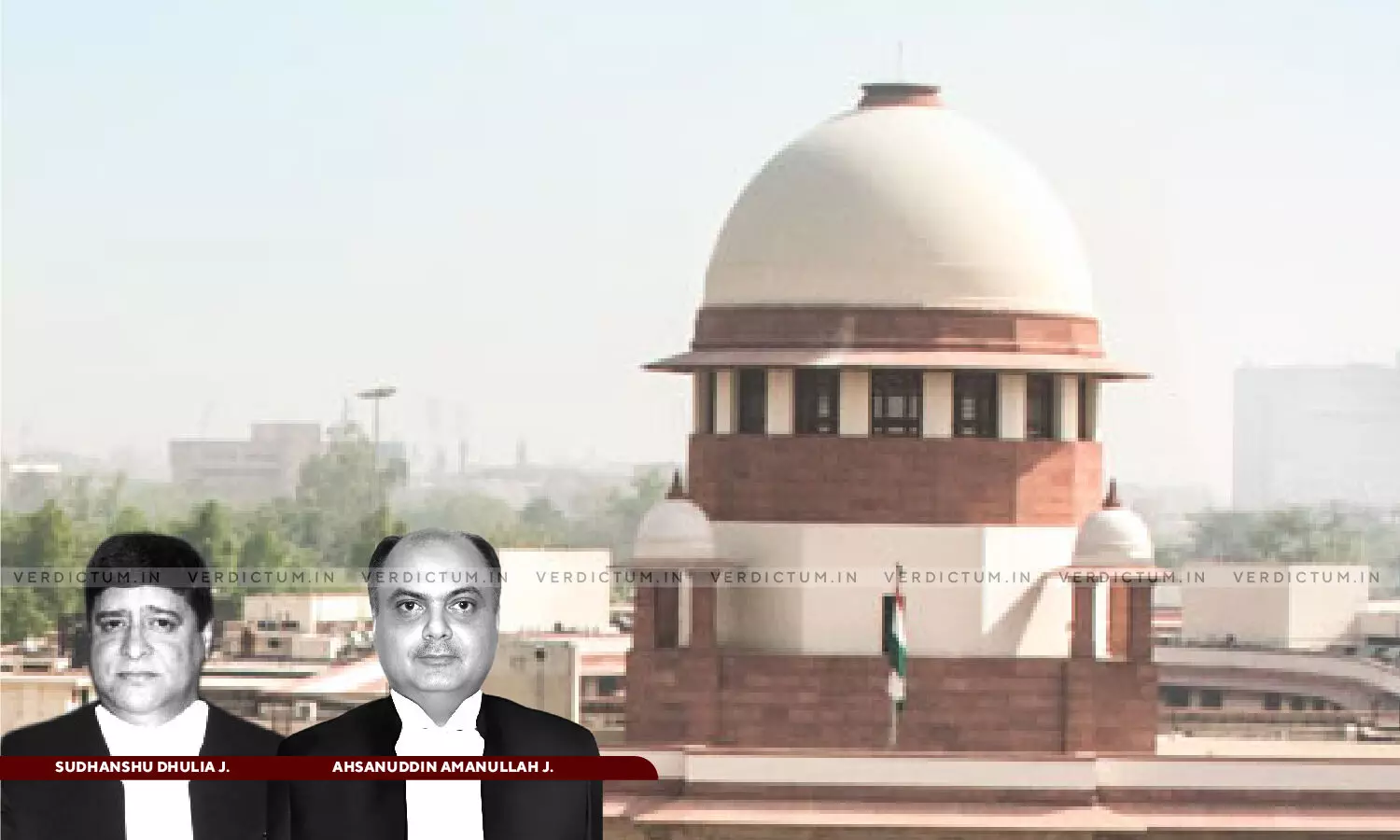
Justice Sudhanshu Dhulia, Justice Ahsanuddin Amanullah, Supreme Court
Supreme Court: Sharia Court Has No Recognition In Law; Any Declaration Or Decision By Such Bodies Not Binding On Anyone
 |
|The Supreme Court set aside the decision of the High Court, which had previously dismissed the Revision Petition filed by a wife, dismissing her claim for maintenance.
The Supreme Court held that the Sharia Court recognition in law, while clarifying that any declaration/decision by such bodies, by whatever name labelled, is not binding on anyone and is unenforceable by resort to any coercive measure.
The Court set aside the decision of the Allahabad High Court, which had previously dismissed the Revision Petition filed by a wife, dismissing her claim for maintenance under Section 125 of the CrPC, upholding the decision of the Family Court. The Bench noted that the Family Court, taking note of the compromise deed before the ‘Court of Kazi’, had opined that it was the wife’s character and conduct which led to the rift in the conjugal life of the parties.
A Bench of Justice Sudhanshu Dhulia and Justice Ahsanuddin Amanullah held, “‘Court of Kazi’, ‘Court of (Darul Kaja) Kajiyat’, ‘Sharia Court’ etcetera by whatever name styled have no recognition in law. As noted in Vishwa Lochan Madan (supra), any declaration/decision by such bodies, by whatever name labelled, is not binding on anyone and is unenforceable by resort to any coercive measure. The only way such declaration/decision can withstand scrutiny in the eye of law could be when the affected parties accept such declaration/decision by acting thereon or accepting it and when such action does not conflict with any other law. Even then, such declaration/decision, at best, would only be valid inter-se the parties that choose to act upon/accept the same, and not a third-party.”
Advocate Sushil Kumar Dubey appeared for the Appellant, while Senior Advocate AK Misra represented the Respondents.
Brief Facts
The husband had filed a 'Divorce Suit' in the 'Court of Kazi', which was dismissed following a compromise between the parties.
The wife had alleged that the husband used to beat her, demanding dowry, and eventually turned her out of their matrimonial home with her children. Subsequently, the wife filed a suit under Section 125 of the CrPC seeking maintenance. However, the Family Court dismissed the claim for maintenance on the finding that the husband did not leave the wife and, rather, she, due to her nature and conduct, was the main reason for the dispute and her consequent departure from the matrimonial home.
The High Court upheld the findings of the Family Court, holding that the wife was living separately from her husband without sufficient reason.
Court’s Reasoning
The Supreme Court noted that the Family Court had denied maintenance after observing that since it was the second marriage of the parties, there was no possibility of demand of dowry by the husband, as he would be trying to rehabilitate his house.
The Bench stated, "Such reasoning/observation by the Family Court is unknown to the canons of law and is based on mere conjecture and surmise.”
“This reasoning is based on the purported fact that the appellant in the compromise deed had admitted to her mistake. However, from a bare perusal of the compromise deed, it would become apparent that it records no such admission. The first ‘divorce suit’ instituted by the husband in 2005 was dismissed on the basis of this compromise, wherein both parties decided to live together and agreed that they would not give the other party any occasion to complain. Hence, the very basis/reasoning for rejecting the appellant’s claim for maintenance appears to be ex-facie unsustainable,” the Bench held.
The Court referred to its decision in Vishwa Lochan Madan v Union of India (2014), wherein it was held that “the decisions of Dar-ul-Qaza or the fatwa do not satisfy any of these requirements. Dar-ul-Qaza is neither created nor sanctioned by any law made by the competent legislature. Therefore, the opinion or the fatwa issued by Dar-ul-Qaza or for that matter anybody is not adjudication of dispute by an authority under a judicial system sanctioned by law.”
Consequently, the Court ordered, “Accordingly, the Order of the Family Court as well as the Impugned Order are set aside.”
Accordingly, the Supreme Court disposed of the Appeal.
Cause Title: Shahjahan v. The State of Uttar Pradesh & Anr. (Neutral Citation: 2025 INSC 528)
Appearance:
Appellant: AOR Rameshwar Prasad Goyal; Advocate Sushil Kumar Dubey
Respondents: Senior Advocate AK Misra; AOR Arup Banerjee; Advocates Amitabh Poddar, Priyanshu Raj, Harshita Raghuvanshi and Rajiv Agnihotri